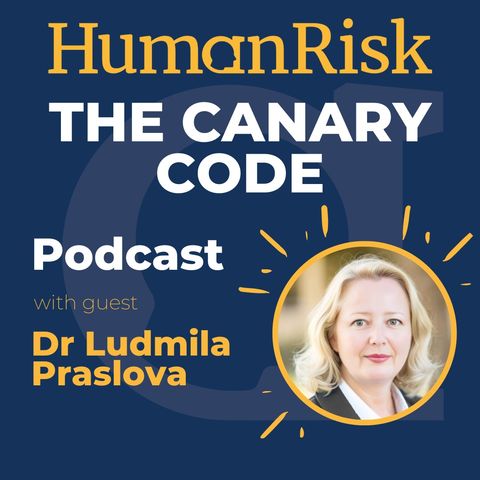Dr Ludmila Praslova on The Canary Code

Download and listen anywhere
Download your favorite episodes and enjoy them, wherever you are! Sign up or log in now to access offline listening.
Description
What can canaries in coalmines teach us about diversity and inclusion? In this episode, I’m speaking to an academic who has some fascinating ideas and insights into how we can...
show moreGuest Bio
My guest, Dr. Ludmila Praslova, is a Professor and the Founding Director of Graduate Programs in Organizational Psychology at Vanguard University in Costa Mesa, California. She is an industrial organizational psychologist with a background in global diversity, intercultural relations, and, more recently, neurodiversity in the workplace.
She’s also the author of a new book called 'The Canary Code: A Guide to Neurodiversity, Dignity, and Intersectional Belonging at Work’ which takes a concept you’ve heard of — the canary in the coal mine — and applies it to the world of inclusion.
Her simple yet fascinating idea is that if we can focus on meeting the needs of those who are most sensitive to negative workplace dynamics and then create an environment that allows them to flourish, we can create an environment where everyone can flourish.
Episode Description:
In our discussion, we explore the importance of removing barriers in the workplace, the pitfalls of traditional hiring practices, and how the Canary Code works in practice. You'll hear
insights on creating inclusive environments, addressing workplace biases, and why something I've often done, viewing neurodivergent traits as 'superpowers', is actually unhelpful.
AI-generated timestamp summary
[00:00:00] - Introduction
- Christian Hunt introduces Dr. Ludmila Praslova, discussing her book "The Canary Code" and its focus on inclusive work environments.
- Ludmila, an industrial-organizational psychologist, specializes in global diversity, intercultural relations, and neurodiversity.
- Ludmila's journey into diversity began with global diversity and now focuses on intersectional inclusivity and neurodiversity.
- The concept suggests that addressing the needs of the most vulnerable employees can improve conditions for all.
- Emphasizes creating flexible work environments to reduce workplace toxicity and improve productivity.
- Neurodiversity includes ADHD, dyslexia, autism, and other neurological differences that impact workplace experiences.
- Managers don't need to specialize in every condition but should create generally inclusive and flexible environments.
- Focus on matching jobs to individual strengths and job crafting to optimize roles.
- Some roles require specific skills and cannot be flexible, but many roles can adapt to a diverse workforce.
- Emphasizes the need for valid, job-relevant assessments in hiring to ensure fairness and effectiveness.
- Some organizations resist flexible work practices, but modern, flexible practices can help attract and retain talent.
- "The Canary Code" is structured to be accessible to CEOs, diversity professionals, and neurodivergent individuals, with stories, research, and practical advice.
- While neurodivergent individuals may see their traits as superpowers, using this as a hiring argument is problematic.
- Advocates for creating environments where everyone can thrive without needing extraordinary measures. Encourages more inclusive and flexible workplace practices.
Ludmila's Faculty Page - https://www.vanguard.edu/about/history
The Canary Code - https://www.penguinrandomhouse.com/books/742858/the-canary-code-by-ludmila-n-praslova-phd/
Ludmila on Social Media
LinkedIn - https://www.linkedin.com/in/ludmila-praslova/
Twitter/X - https://x.com/ludmilapraslova
A piece explaining the point we discussed on the show about why neurodiversity isn't a 'superpower' - https://www.psychologytoday.com/us/blog/positively-different/202405/healing-the-invalidation-the-complex-truth-of-autism
Information
| Author | Human Risk |
| Organization | Human Risk |
| Website | - |
| Tags |
Copyright 2024 - Spreaker Inc. an iHeartMedia Company

Comments